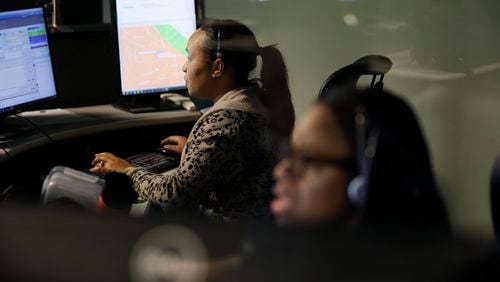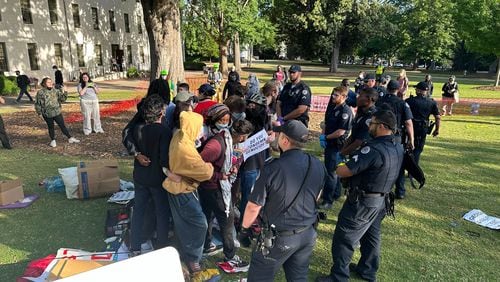“Every single second counts.”
Those words from Ty Wooten, a director at the International Academies of Emergency Dispatch, help explain why Georgians should be concerned about the seconds lost — sometimes minutes of them — waiting for 911 operators to answer.
In a stunning report published in The Atlanta Journal-Constitution last weekend, AJC reporters Katherine Landergan and Stephanie Lamm unearthed data from area emergency response services and found that too many are lagging national standards in emergency call response times. Their findings were startling. The most egregious: In DeKalb County, only 54 percent of calls to 911 are answered within 20 seconds. The industry standard is for 95 percent of emergency calls to be answered within 20 seconds.
The result of those dismal statistics? “Those precious minutes really could be the difference between living and dying,” said Angela Monroe-Wood, who was put on hold when she called 911 after she heard gunshots in her neighborhood. One family suggested people learn first aid and “think for yourself” in an emergency. “It’s like you’re left out there alone, in a crisis,” said Tonya McElrathbey, whose daughter, Brittany, was shot while sitting in her brother’s home. Instead of waiting for 911 to connect, Brittany’s brother drove her to an area hospital (”running red lights, striking curbs and exceeding 60 mph”). “Be prepared for 911 not being there for you,” Tonya warned.
Georgians — especially Georgians in distress — deserve better.
If you live in DeKalb or Gwinnett counties, you should be particularly concerned: They had the worst call waiting times of agencies reviewed in the Metro Atlanta area.
The reasons callers languish on hold are myriad. Staffing shortages, call volume and aging technology mean people are left waiting when they most need help.
The International Academies of Emergency Dispatch and the National Association of State 911 Administrators in 2023 surveyed the staffing levels of 911 centers to “understand the challenges these centers face in maintaining an adequate workforce.” Emergency call-center staffing nationwide decreased during the pandemic, exacerbating an existing problem. Work schedules, overtime, pay and stress were the leading reasons people left jobs at emergency call centers.
The groups noted that many emergency call centers use voluntary or mandatory overtime to fill scheduling gaps or use part-timers and redirected employees. None of those workarounds is sustainable. Mandatory overtime and reassigning employees to jobs they don’t want and for which they might not be qualified surely lead to burnout and resentment, especially in the high-stakes environment of a 911 call center.
Many agencies are increasing pay and expanding hiring. Landergan and Lamm reported that last year Atlanta E-911, the agency that handles emergency calls for the city of Atlanta, hired 50 more operators, “raised the starting salary for 911 operators by thousands of dollars — to about $43,000 annually — and approved additional bonuses.” Atlanta met the industry standard as recently as 2019.
Though not every county has the resources to make similar investments, nothing is more important than saving the lives of Georgians.
Technology and education can drive better call-center performance, too.
Atlanta has invested in technology that calls back people whose calls were dropped and that maps caller locations instead of relying on callers to divulge accurate information, which can be difficult for someone in crisis. Seconds not spent trying to get a caller to figure out if she’s on Piedmont Road or Piedmont Circle can be better spent dispatching emergency personnel.
The rest of us can help, too.
Atlanta started a campaign this spring to educate residents on when to call 911 or 311. Too many “emergency” calls are for non-emergency situations, and that can lead to longer wait time for those in truly urgent situations.
The Atlanta police noted that of the 1.3 million calls answered by Atlanta’s emergency line in 2023, half were for non-emergencies and only 45,000 were considered “high-priority.” The other stuff? Potholes, neighbor disputes and the like. Common sense dictates that those are not 911′s issues to solve.
Launched on March 11, the “Make the Right Call” campaign notes that “issues involving landlord-tenant disputes, barking dogs, noise complaints, illegally parked [cars] and lost and found property” should properly be directed to 311, not 911.
In DeKalb, a new director of the county’s 911 center, Carina Swain, is working to improve her county’s answer speed.
Swain called her county’s call metrics “alarming.” She plans to upgrade the center’s phone system and has adjusted the number of people assigned to busy shifts. Even so, within a year the center is expected to be answering only 80 percent of calls within 20 seconds — still well short of the 95 percent industry standard.
Cobb County hiked pay and is working to improve working conditions, including addressing mental health issues faced by call-center employees.
That’s all a good start. Accountability — from residents and from emergency dispatch centers — in this critical space is paramount. That means using the best technology available and paying call-center workers fairly and scheduling them humanely. Perhaps the jurisdictions that are meeting standards or making rapid improvements in call-center performance can share best practices with the areas that are lagging.
When lives are on the line, Georgians should be able to depend on emergency services for the most basic of things: answering the call.






